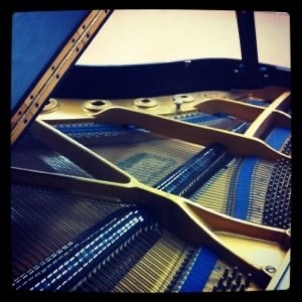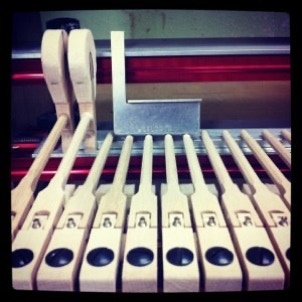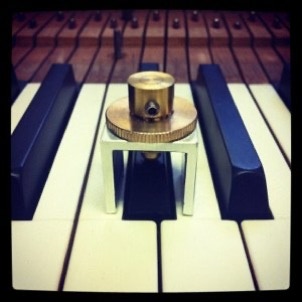
Services
Tuning:
Pianos are engineered to be tuned to the international pitch of A440 Hz, but humidity and weather changes significantly affect the pitch and tuning of a piano. It is important to keep your piano up to pitch so that it will give you its’ best sound and make playing more enjoyable to yourself and those around. If a piano has not been maintained (tuned at least once a year), it will most likely require a pitch raise.
Voicing:
As a hammer repeatedly hits a string over and over again, the felt on the hammer becomes compacted, resulting in an uneven tone, and often a harsh or metallic sound. Voicing a piano allows for the hammers to return to their full potential and give you more dynamic range and color.


Regulation:
Hundreds of tiny mechanisms all work together inside your piano that allows the hammer to strike the string as you press the key. This is called the “action”, and like all complex machines, the piano action requires periodic adjustments to compensate for wear and changes in the clothe, felt, and wooden parts sensitive to humidity. If you notice sticking keys, an uneven feel, or a “heaviness”, a regulation will have your piano feeling smooth and free again.
Repairs:
A loose keytop or a disengaged pedal are two of many small things that can happen during the lifetime of your piano. Many repairs are simple and can be fixed in your home.
Price varies on repair.
Cleaning:
Key tops, soundboards, cabinets, and inside the piano all collect dust, fingerprints, and grime. Keeping your piano clean helps to extend its’ life and rids it of harmful dust, mold, and/or chemicals previously used to ward off rodents.
Humidity Control:
The Piano LifeSaver System made by DamppChaser can be installed in your upright or grand piano to maintain a constant humidity, extending the life of your piano. Tunings will become more stable, expansion and contraction of the action parts will be minimal, strings and metal will not rust, hammer felt will last longer, and glue joints will be less likely to fail.
Price varies on system.

Visit http://www.pianolifesaver.com/english for more information.
Harpsichords:
Harpsichords helped to birth the modern piano, sharing many similarities. However, the internal mechanism is quite different, where the strings are plucked, not hammered. Tuning, voicing, and regulation is offered to help maintain your harpsichord.
Call for more information. 904-909-5497